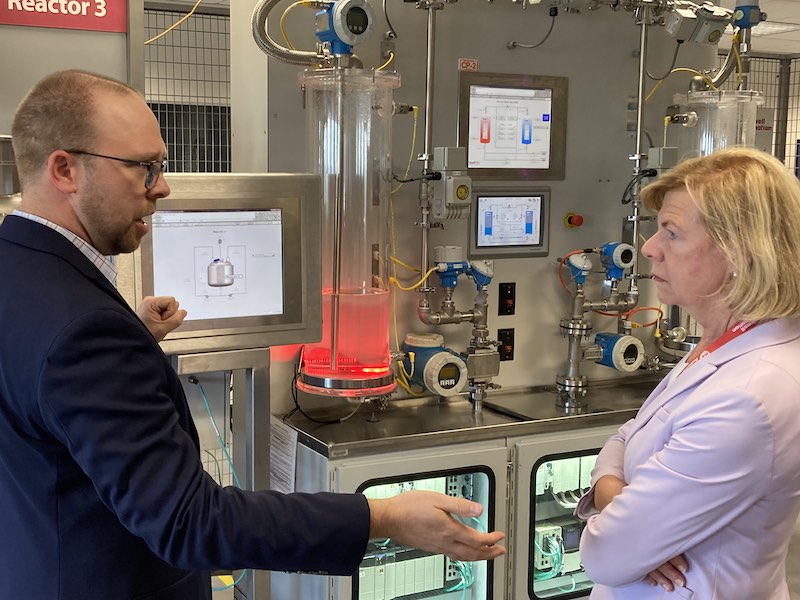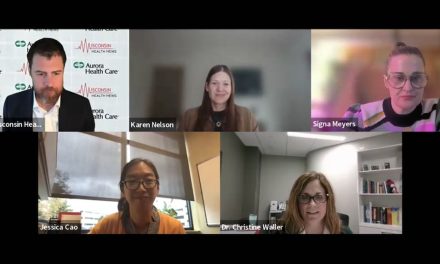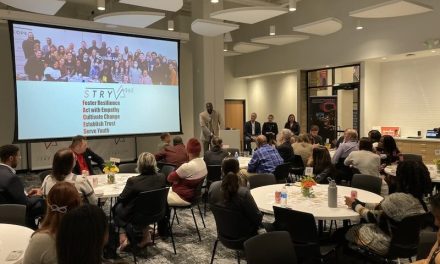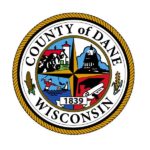
Wisconsin biohealth consortium seeks to become regional tech hub

Leaders from educational institutions, companies and economic development agencies are working to bolster Wisconsin’s biohealth industry.
A consortium of 15 private and public groups, organized by the Wisconsin Economic Development Corporation, is pursuing a federal designation as a regional tech hub, which could enable the state to receive tens of millions of dollars to advance personalized medicine and biohealth technology.
Wisconsin Democratic Sen. Tammy Baldwin, who supported the law creating the designation, is calling on President Joe Biden’s administration to approve the state’s application. Baldwin noted the idea of establishing regional tech hubs came in part from a Brookings Institution study that gave high ratings to cities in and around Wisconsin for having the assets necessary to develop them.
“We have such an opportunity to really make an impact,” she said at Rockwell Automation Wednesday.
Missy Hughes, secretary and CEO of the Wisconsin Economic Development Corporation, said that they expect the federal government to designate around 20 regional tech hubs. Wisconsin will then compete for funding.
Lisa Johnson, CEO for BioForward, the state’s biohealth trade association, said Wisconsin has “all the pieces” for a hub, like manufacturing, and medical research institutions. The state has “such a broad strength” in bioscience and healthcare innovation, including in digital health, medical devices and diagnostics, she said.
Aaron Olver, chair of the consortium steering committee and managing director of University Research Park, said he hopes the designation helps the state’s biohealth scene gain national recognition.
“My hope is that when Sen. Baldwin is back in Washington and her colleagues are talking about Wisconsin, they not only say beer, brats and cheese curds, but they say biohealth,” he said.
Hughes spoke with Wisconsin Health News about the designation following the event in Milwaukee.
Edited excerpts are below.
WHN: How did this consortium come together?
MH: We convened at times 30, at times 40, leaders for a few months to have conversations around what kind of an application we should put forward. And if you look at the (U.S. Economic Development Administration’s) delineation for the application, there are 10 different topic areas. This group of leaders went through each of the topic areas and said, ‘Where do we have prowess? Where do we have opportunity?’ In Wisconsin, our economy is so diverse that there were actually a number of different topics that seemed like we could go after for a tech hub application.
I had the chance to hear the undersecretary of the (Economic Development Administration) talk. And she said, ‘I want to designate areas that are on the edge of glory, that, with this designation, with funding, they will go over the top to glory.’ And as we went through those 10 topic areas, biohealth … we felt like was the one that was most on the edge and the most, with just a good push, would really reach that opportunity to increase Wisconsin to global competitiveness, address national security issues, create jobs, all of these different pieces of the puzzle.
WHN: Receiving this designation could open the state up to receive $50 to $75 million in federal funds under the CHIPS and Science Act of 2022. When would that funding arrive and where would it go?
MH: We anticipate, from what (the Economic Development Administration) has said, that the designation will come in the next short while. Hopefully, that’s in the next couple of months.
And then what we’ve seen with these applications is they’re on a pretty fast timeline. Literally, for this application, the period started on June 15, and the application was due on Aug. 15. It was a full sprint. So we would anticipate that application process would also be short and fast. It’s the federal government, so we don’t know exactly how these things will work out. But, hopefully, the funding would start to come to Wisconsin, I would say, sometime in 2024, maybe mid- or late 24.
Part of that process for that next application is when we’ll really designate, ‘This is how we would spend those dollars.’ I think it’d be in those three big buckets of workforce, entrepreneurship and research. But that still has to be wrestled to the ground about what’s the best use.
WHN: Consortium members are primary in the Madison and Milwaukee areas. Are you looking to grow it further?
MH: I would see us reaching up into the Fox Valley, reaching up to Green Bay because it’s so manufacturing focused. We have manufacturing all around the state. Eau Claire is doing really interesting things with the Mayo Clinic around healthcare and developing that.
So, literally, we had this 90-day sprint. We brought the team together. And you can imagine that now we’ll start to think about, ‘How do we pull in these other parts of the state and the really interesting things that are happening?’
WHN: If the state gets this designation and funding, what do you see as the potential for this? What do you envision five years from now?
MH: I think what we’ll see, first and foremost, is this real corridor between Madison and Milwaukee develop in a really meaningful way and then we’ll see opportunities spin off of that … When it comes to the work that is happening between the university and the industry, we’re going to see a sea change in healthcare. This personalized medicine is just incredibly important for how quickly we’re going to be able to identify disease, move to treating it and curing it, and then getting people back into their lives.
This article first appeared in the Wisconsin Health News daily email newsletter. Sign up for your free trial here.





